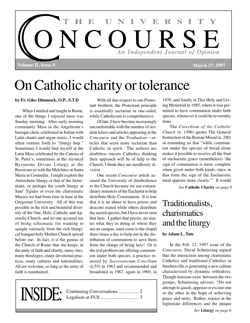The complexity of schooling choices
by Susan C. Fischer
Joanna Bratten’s recent article on homeschooling, though titled: “To homeschool or not to homeschool,” quickly became, not a discussion of the pros and cons, as the title implied, but rather a testimonial in favor of homeschooling, based on the author’s positive personal experience.
I am pleased to hear she had such a positive experience; however, her article did not give the new parent a true gauge of the multitude of factors involved in the decision “to homeschool or not to homeschool.”
The decision to be made regarding the education of one’s children is, to say the least, complex, and the factors to be considered so numerous that I would bore the reader if I attempted to list them all. Instead I will try to encapsulate them into three interrelated categories. The first category pivots around the idea of the “ability of the parents” to homeschool. Though Miss Bratten briefly addressed this issue, she reduced it to a question of the mother’s intellectual competence. I propose that there are, in fact, many more factors at play in the question of the parents’ ability or inability. (It’s important to note that “inability” in this realm does not necessarily imply failure, but might rather be an honest evaluation of a family’s current status, which is to be respected and valued. In fact the term “inability” is almost inappropriate here.) Is the primary educator (i.e.: the mother) emotionally, spiritually and physically equipped to properly educate her children, care for her home and husband, and keep “her head above water” at the time the schooling is needed? Are both spouses in agreement as to the mode of education? Is the parent/child relationship in such a state that education in the home may proceed peacefully and fruitfully?
A second category I would like to broach involves the needs of the student. Every person is a unique and unrepeatable person, deserving to be viewed as such in all areas. Parents have to be attentive to the uniqueness of each child, not only in the academic area, but in the social and emotional realms as well. Education’s goal is to see to the full development of the person in all of his powers. It doesn’t end when a child walks into the home from school or after the homeschool lesson is completed for the day. Objectivity and some emotional ‘space’ is needed on the part of the parents in order for them to be able to continually assess the academic, social and spiritual needs of their child, and to discern the best provision for their completeness.
My third category is closely linked to the second. Following the assessment of the child for his needs is the survey of the educational options available to his family. Public school systems, poorly reported in Miss Bratten’s article, might have a better mechanical drawing course for your 15-year-old aspiring architect. The Catholic schools in your given area might employ highly trained orthodox religion teachers, who prepare your child for first communion with depth and beauty. On the other hand you might find some objectionable materials taught in your particular district. It is appropriate for parents to look openly at all systems before choosing one or the other.
Decisions regarding the education of children are complicated and often inexplicable to friends and family. This is where it is prudent not to judge what ‘others’ are doing, nor assume an attitude of superiority regarding one’s own mode of education. What suits one child and family might ill suit another, and might actually produce harm if imposed upon them. Most of all, it would befit new parents to remember that the sacramental graces of marriage remain alive and active for the spouses to rely upon as they together pray for the wisdom to know how to gently and lovingly guide the maturing process of their beloved offspring.
Susan Creel Fischer, Class of ‘84
Susan and her husband, John (class of ‘83) live in Steubenville. They have four children.


